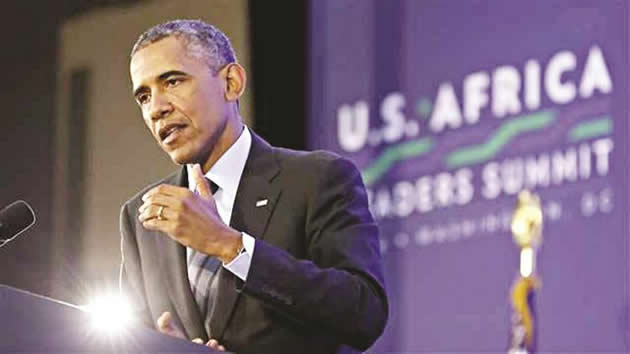Africa-China plug worries US

 Glen Ford
Glen Ford
Leaders from the vast bulk of Africa’s nations were summoned to Washington, last week, for a three-day US-Africa Leaders Summit under the theme “Investing in the Next Generation.”
According to the White House, the guest list includes all those leaders who are “in good standing” with the United States, a definition that excludes Zimbabwe, Sudan and Eritrea. Not coincidentally, the three shunned states are the only African nations that have rejected any relationship with Africom, the US military command that now dominates the continent.
Africom has everything to do with the question of who will comprise the “Next Generation” of African leaders, and whom their trading partners will be. In the course of just six years, Africom has reduced the armies of the continent to appendages of the Pentagon, dependent on the United States for training, financing, equipment, intelligence — even troops’ salaries and the medical care of soldiers and their families. African heads of state are acutely aware of their own commanders’ intimate ties to the Africom sugar daddy. Ultimately, soldiers are loyal to those who finance and equip them.
The African Union, itself, is incapable of mounting even the most modest “peace keeping” missions without Africom’s comprehensive support. The AU’s biggest operation, in Somalia, is entirely paid for by the US and Europeans, and directed by the CIA. Therefore, when the White House says that invitees to this weekend’s summit must also be “in good standing” with the African Union, it is with confidence that the AU’s list is identical to its own.
No longer in good standing among the subservient political classes of Africa are the followers of Kwame Nkrumah, Patrice Lumumba and Thomas Sankara. Nkrumah, the first president of Ghana, envisioned a continent united to forge true economic and political independence under its own military defence. He was deposed in a CIA-sponsored coup. Among Dwight Eisenhower’s last acts as president was to order the assassination of Patrice Lumumba, Congo’s first democratically elected prime minister. Burkina Faso’s Thomas Sankara, once known as “Africa’s Che Guevara,” was assassinated by former comrades who quickly reversed the nationalisation of foreigners’ properties.
Burkina Faso now hosts a US drone base.
Six million Congolese are no longer standing above ground, victims of the worst genocide since World War Two, begun in 1996 by the Clinton administration’s proxies, the military governments of Yoweri Museveni of Uganda and Paul Kagame, of Rwanda. The bloodbath was set in motion by a previous genocide in Rwanda, sparked by the downing of an airplane carrying the presidents of Rwanda and neighboring Burundi by the forces of then-rebel leader Kagame. Both Rwanda and Uganda remain in the best of standing with Washington, which proclaimed them shining examples of the “new generation” of African leaders. This distinction is shared with the leadership of Ethiopia, which is engaged in multiple genocides at home and, with George Bush’s full spectrum military support in 2006, interrupted a brief outbreak of peace in Somalia with an invasion that resulted in “the worst humanitarian crisis” on the continent and the deaths of half a million people, setting the whole of the Horn of Africa ablaze.
Muammar Gaddafi was definitely not a leader in good standing with Washington, although he was a respected personage in the African Union, having co-founded the organisation in 2002 to replace the moribund Organisation of African Unity, and served as chairman in 2009 and 2010. Gaddafi infused $300 million into direct development of Africa, and pledged billions more — a process cut short by the US and its Nato allies in 2011 when, as future president Hillary Clinton gleefully described it, “We came, we saw, he died.”
As Gaddafi had predicted, the resulting chaos has set the Sahel region and West Africa afire, destabilising Nigeria, Mali, Niger, Cameroon and Chad — all of whose leaders in May of this year to accept a western plan for their common security — mainly under the auspices of Africom.
Last week’s summit in Washington was supposed to be about trade, but it’s not. If the US empire was based on the give and take of trade, it would be a third rate influence in Africa, where China does twice as much business as the US and European trade far exceeds that of the US and China, combined. Brazil, India and Turkey are also major players in Africa. If the $900 million in deals that the US Commerce Department claims will be announced at the August 4-6 Washington conference is crucial to African development, then the $1 trillion in loans, alone, that China will extend to the continent by 2015 should seal the deal in favour of Beijing. If the lasting fruits of trade is creation of permanent infrastructure such as ports and roads, then the Americans have nothing to offer to match the Chinese, who also provide the most favourable terms of investment and no political strings attached.
However, US imperialism does not sustain itself by competitive trade, but by force of arms. It is a predatory system maintained by military coercion. Africom exists to ensure that mutually beneficial African trade with China and Brazil results in no shift in African nations’ political orientation, and is perpetually subject to curtailment by the US Africom spins its web of Special Forces, warlords, mercenary armies and “counterinsurgency” infrastructure throughout the whole of the “resource continent.” The West’s purpose is not to exploit the entirety of Africa’s natural bounty, which is beyond the economic capacity of a purposely de-industrialising finance capitalist order centered in New York, London and other bankers’ redoubts, but to establish the military presence in depth that will allow Washington and its allies to stymie, at will, the integration of Africa into a multi-polar world in which China is the centre of gravity.
The aim is not so much to keep China, Brazil, India and other rising economies out of Africa — not for the time being, anyway — since the economically declining West cannot possibly satisfy the continent’s need for investment. An attempt to choke off China could spark a revolt among the indigenous capitalist and aspiring classes of Africa — perhaps even among the more entrepreneurial elements of the military.
But, it was also imprudent for the United States to engineer a coup in Ukraine to provoke a war on Russia’s doorstep, inflicting great economic pain on its European allies. The Obama administration has placed all its bets on US imperialism’s sole surviving advantage: overwhelming military superiority, without which economic sanctions are unenforceable.
Obama’s “pivot” to the Pacific will inevitably result in a similar throw-down against China — sooner rather than later, since America’s descent into madness will greatly accelerate the growing Sino-Russian alliance. Just as the Americans strong-armed the Europeans into sanctioning Russia, the US will soon flex its Africom muscles against China.
In theory, at least, a multiplicity of trading partners gives Africa an opportunity to negotiate the best deal, a semblance of independence from the colonial past. However, the US imperial overlord, now deeply embedded in all but a few African nations, believes it has the power to pull the plug on the China connection.
l Glen Ford is executive editor of Black Agenda Report www.blackagendareport.com/content/obama-summons-africa-washington-talk-trade-and-how-cut-out-china, where this article was first carried.










Comments